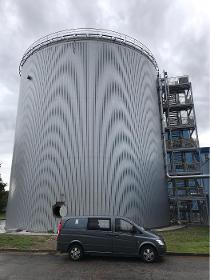- europages
- >
- COMPANIES - SUPPLIERS - SERVICE PROVIDERS
- >
- biomass heating
Results for
Biomass heating - Import export

RIPPERT ANLAGENTECHNIK GMBH & CO. KG
Germany
Heating technology with a future The calculation is simple, the technology successful. Efficient surface drying is achieved with biomass in Rippert plants. Together with the Hargassner company from Austria, a specialist for heating with biomass, and the proven Rippert plant know-how, the technology is now marketable and has gone into production. The demanding drying characteristics in a powder-coating plant are compatible with the process and work perfectly. A future-orientated heating technology with considerable economic and ecological benefits – the experts are unanimous in that. Wood pellets or wood chips are the inexpensive energy suppliers. They are valuable waste products that result from the processing of domestic timbers. Heating with wood chips – without intermediate heat transfer media such as thermal oil • Environmentally friendly and CO2-neutral • fully automatic boiler cleaning and ash discharge Maximum financial saving potentials are realised with this energy carrier. Wood chips, chopped to a transportable size and dried by the supplier, are stored in the storeroom near the plant. It can be located on the same level or lower. A tried-and tested transport system consisting of a floor agitator with springs and discharge auger carries the wood chips reliably into the plant. Here it acts as a fuel with maximum convenience. If the calorific value equivalents are examined, we see that 1,000 litres of fuel oil is equivalent to 12 m³ of wood chips. The ratio is the same for 1,000 m³ of natural gas. Heating with wood pellets - without intermediate heat transfer media such as thermal oil Wood pellets are true energy bundles. They consist of natural wood and are made by compressing sawdust, which is produced in large quantities every day in the industry. As a biomass they are the alternative to wood chips and are just as advantageous from an economical point of view. Pellets have the smallest volume and are conveyed dust-free and without odours from storage containers to a storage vessel next to the plant. They are transported into the combustion chamber via a rotary vane feeder and feed auger. For comparison: 1,000 l fuel oil = 2 t pellets 1,000 m³ natural gas = 2 t pellets 1,000 l liquefied gas = 1.32 t pellets Advantages • Reduction in energy costs Heating cost comparison (reference = 1,000 l fuel oil)
Request for a quote
LIPP GMBH BEHÄLTER UND SYSTEMLÖSUNGEN
Germany
SOLUTION TO EFFECTIVELY STORE EXCESSIVE HEAT FROM BIOGAS PLANTS – FROM 2,000 TO 6,000 M³ The LIPP® Thermal Storage Tank is a customized solution to effectively store excessive heat from biogas plants, biomass heating plants, solar plants or other heat sources. The carbon steel tanks are fabricated on site with the patented automated LIPP® Welding Technology. The horizontal MAW welding process enables the infinitely variable production of tanks up to 6,000 m³ volume with horizontal welding only. The large volume, above ground storage tanks are fitted with all necessary safety and operation equipment. Additional, individual components according to client’s specification can be considered. The roof and wall insulation is individually adapted to local conditions. The LIPP® Thermal Storage Tanks operate at atmospheric pressure, at a temperature of up to 95° C and are suitable for use with heating water. No additional nitrogen system necessary.
Request for a quote
LIPP GMBH BEHÄLTER UND SYSTEMLÖSUNGEN
Germany
The LIPP® Large Thermal Storage Tank is a customized solution to effectively store excessive heat from biogas plants, biomass heating plants, solar plants or other heat sources. The carbon steel tanks are fabricated on site with the patented automated LIPP® Welding Technology. The horizontal welding process enables the infinitely variable production of tanks up to 6,000 m³ volume with horizontal welding only. The largevolume, above ground storage tanks are fitted with all necessary safety and operation equipment. Additional, individual components according to client’s specification can be considered. The roof and wall insulation is individually adapted to local conditions. The LIPP® Thermal Storage Tanks operate at atmospheric pressure, at a temperature of up to 95° C and are suitable for use with heating water. Speciality No additional nitrogen system necessary.
Request for a quote
LIPP GMBH BEHÄLTER UND SYSTEMLÖSUNGEN
Germany
CONTAINER AND SYSTEM SOLUTIONS FOR THE INTERMEDIATE STORAGE OF HEAT FROM WASTE HEAT OR RENEWABLE ENERGIES The intermediate storage of heat from biogas plants, biomass cogeneration plants or other heat sources is an important prerequisite for effective use. Lipp buffer tank systems are economic system solutions for the storage and supply of thermal energy and can be easily integrated into customised solutions for local heat supply. LIPP BUFFER STORAGE TANKS The individually tailored solution appropriate to heat storage requirements with useful volumes of 80 to 3,000 m³ is made of stainless steel with the Lipp dual seam system and operated in conjunction with insulation adjusted to the application at about 95 ° C. Since the Lipp system is unpressurised, the container solutions are extremely low maintenance and are very durable. The high volume, above ground Lipp storage tanks have been specially developed for this application and are popular with end users and energy suppliers alike.
Request for a quoteDo you sell or make similar products?
Sign up to europages and have your products listed
Results for
Biomass heating - Import exportNumber of results
5 ProductsCountries
Company type
